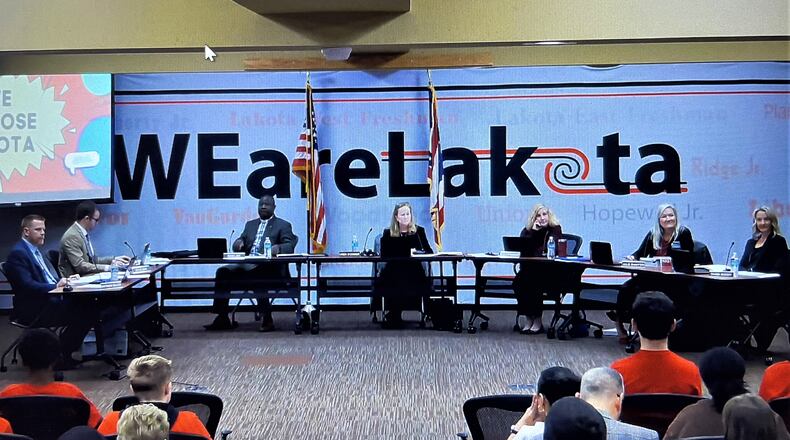Though the plan, which may see a still-to-be-determined number of schools closed and new ones built in their place, will take years to install and the next steps will include a series of community conversations to further discuss how the 17,200-student district should proceed.
It’s the first, fully new facilities plan created by Lakota officials in about two decades but a number of board members reiterated it does not mean any imminent decisions on which of Lakota’s 22 schools will be changed nor how their current grade levels will be configured.
“Because we are picking a (facilities plan) option does not mean we are breaking ground tomorrow,” said Board Member Kelley Casper.
“It (plan) is not set in stone,” said Casper, who added during the upcoming process of narrowing down more detailed choices on how exactly to replace, modernize and expand some of Lakota’s older school buildings, the board may adopt some aspects of the other three preliminary plans.
For years, some of Lakota’s oldest schools, such as the Lakota West Freshman School in West Chester Twp. — which is largely the same building that opened in the early 1960s to house the old Lakota High School — have been patched up and remodeled rather than replaced.
And a building’s age is not always indicative of problems.
Cherokee Elementary’s growing enrollment and lack of classroom space has forced the school to use module or portable classrooms on its grounds, a stop-gap measure for overcrowding that education experts agree is less than ideal for students.
Lakota Superintendent Matt Miller noted in a released statement on the facilities process: “Once the plan is selected, the committee can get to work in order to determine how our facilities can support our students’ education in the best way possible.”
“We will be engaging our staff, families, students and community as the details are worked out. Our schools belong to our community, and we want to work together to build the plan that will carry Lakota into the future,” said Miller.
Implementation of whatever final facilities plan is later formulated could take a school construction time frame of eight to 10 years to become a reality.
The preliminary option chosen by the board would cost more than $500 million and eventually, likely in a few years said district officials, will also require voter approval of a tax bond issue, which if approved would then trigger an influx of millions of dollars in state school construction funding to help offset costs to local taxpayers.
A current estimate of $11 million in operational savings may also be generated as outlined in the early plan, said district officials.
Still to come in 2023 will be a series of community and school board discussions to gather input as the district narrows down possible grade reconfigurations for some of its schools.
Lakota Board of Education President Lynda O’Connor said “the details will be fleshed out as we go. There is a tremendous amount of work still to be done … and a lot of community engagement.”
In other board action, members voted 4-1 to adopt a new public comment policy for board meetings with Boddy the lone vote in opposition.
Under the new policy, residents of Lakota will no longer sign up to speak just prior to board meetings but instead must register to speak via an online form – or by signing up in person by 9 a.m. the day of the board meeting – to speak.
Moreover, in the wake of a recent lawsuit settlement the board has now adopted a policy that neither complaints nor compliments of Lakota school employees will be allowed during the public comment portion of meetings.
Lakota resident Jesse Rusty said the new policy “will lead to more lawsuits against the district” and that it restricts public free speech rights.
But some board members said there remains other ways for residents to directly contact and communicate with members and Lakota district officials all unaffected by the new policy.
O’Connor has previously said the new policy will be revisited about six months into 2023.
About the Author

